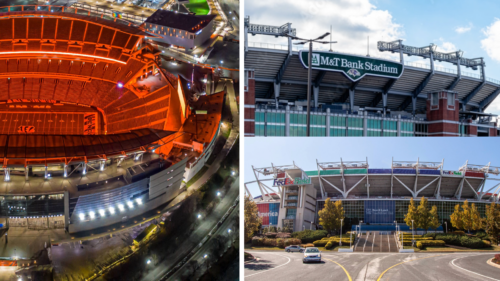By David Almany, Sr. Project Manager
Venues Practice Group
 The NFL recently approved, for the first time, the use of private equity investment as a component of the ownership structure of its teams. Among other ramifications, this decision could dramatically reshape the landscape of stadium development and fan experiences. The move opens the door to increased financial flexibility and capital flow, paving the way for a potential boom in stadium enhancements and new construction across the league.
The NFL recently approved, for the first time, the use of private equity investment as a component of the ownership structure of its teams. Among other ramifications, this decision could dramatically reshape the landscape of stadium development and fan experiences. The move opens the door to increased financial flexibility and capital flow, paving the way for a potential boom in stadium enhancements and new construction across the league.
One of the most significant potential outcomes of this private equity infusion is a rising wave in modernization and enhancement of NFL stadiums. Following the stadium building boom of the 1990s and 2000’s, NFL teams have continued seeking ways to elevate the game-day experience for fans, even while the buildings of that era now begin to reach the end of their originally anticipated “useful life” (not to mention the terms of their original lease agreements). However, the debate over public financing of stadium projects remains unabated, and many NFL owners are expected to commit significant private funds toward stadium projects. Meanwhile, stadium enhancement is one of the most certain avenues for the franchise value enhancement that is the fundamental goal of private equity investment. It’s a reasonable expectation that the key assumption in many PE investments will be that the capital will be applied directly to stadium projects. With this increased financial backing, the NFL could see a surge in cutting-edge stadium upgrades. These enhancements are likely to focus on several key areas:
For teams, the influx of private capital presents a unique opportunity to gain a competitive edge. Enhanced stadiums not only improve the fan experience but also bolster a team’s ability to attract high-profile events like the Super Bowl, the FIFA World Cup, or international sporting competitions. A modern, state-of-the-art venue can become a powerful tool for generating additional revenue streams through these large-scale events.
Additionally, updated stadiums improve a team’s image, potentially attracting more sponsorship deals and partnership opportunities. By offering a cutting-edge fan experience and a luxurious environment, teams can increase the value of their brand – again serving precisely the goal that PE seeks to achieve — ensuring long-term success both on and off the field.
While private equity investment opens the door to many exciting possibilities, it also introduces potential challenges. Teams and investors will need to balance the desire for immediate improvements with the long-term sustainability of these projects. Overextending on lavish upgrades could pose financial risks, and teams will need to ensure that the revenue generated from these enhancements justifies the initial investment.
Furthermore, the nature of private equity involves a focus on returns, which could lead to other changes in how teams operate or the expectations placed on them to generate profit. Teams and investors will need to strike a careful balance between maintaining the integrity of the sport and capitalizing on new business opportunities.
As the NFL embarks on this new chapter with private equity investment, the potential for stadium enhancements is immense. From cutting-edge technology to immersive fan experiences and sustainable design, the future of NFL stadiums is poised to be more exciting and engaging than ever before. With increased financial backing, NFL teams now have the means to transform their venues into world-class destinations, further solidifying the league’s dominance in the global sports landscape.
In the coming years, fans can expect to see a wave of innovation that will redefine the stadium experience and ensure that NFL venues continue to be at the forefront of sports and entertainment.
David Almany is a senior project manager within the B&D Venues Practice Group. In this capacity, he acts as a strategic advisor to clients in intercollegiate athletics and professional sports organizations, assisting them in defining the initial scope and development of projects related to athletic performance and training, public assembly, and entertainment-based mixed-use districts. His role extends beyond mere consultation; he remains a trusted advisor throughout the entirety of the project lifecycle, providing process oversight and management during the stages of project design, construction, and implementations. He can be reached at dalmany@bdconnect.com.